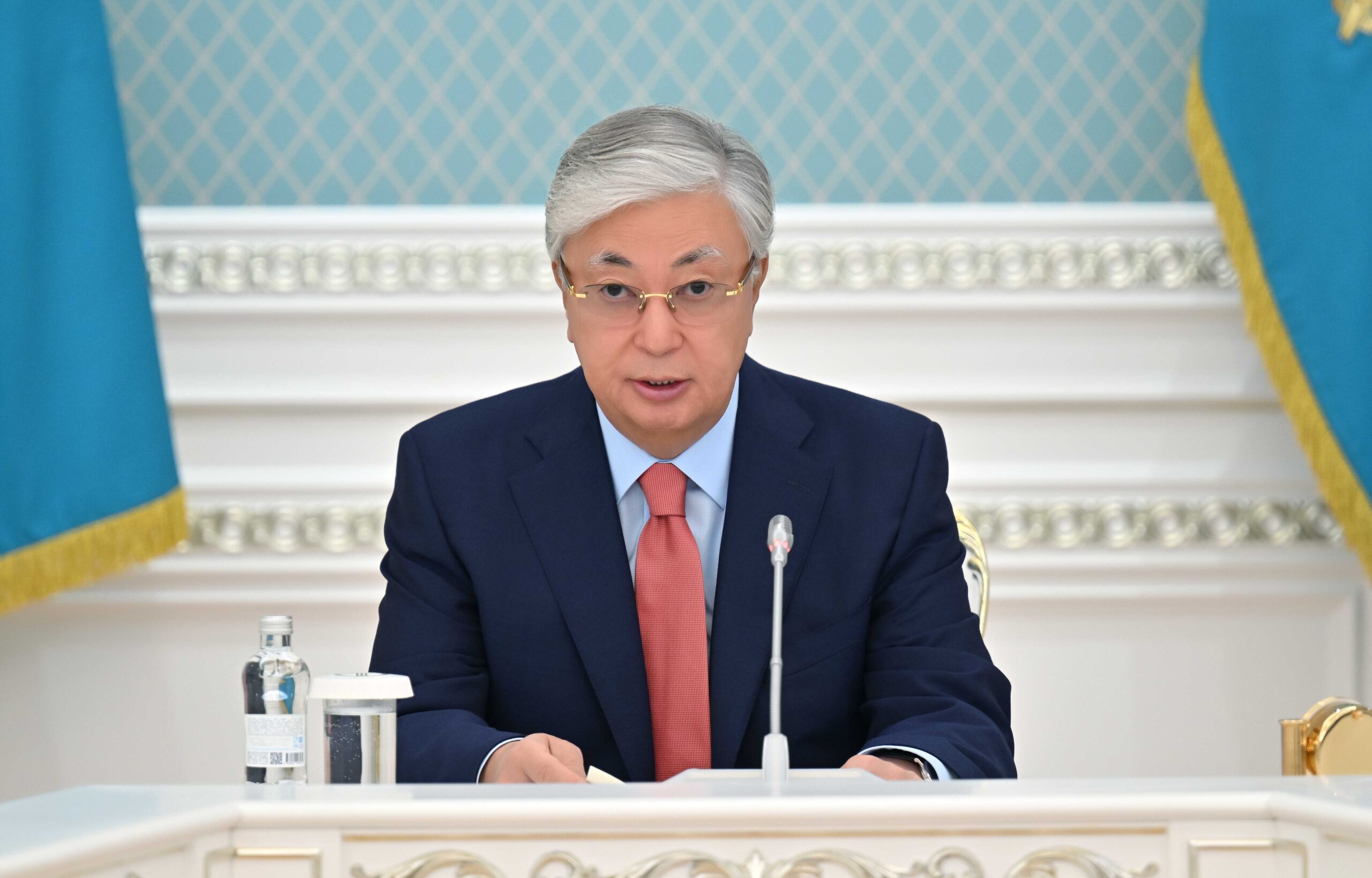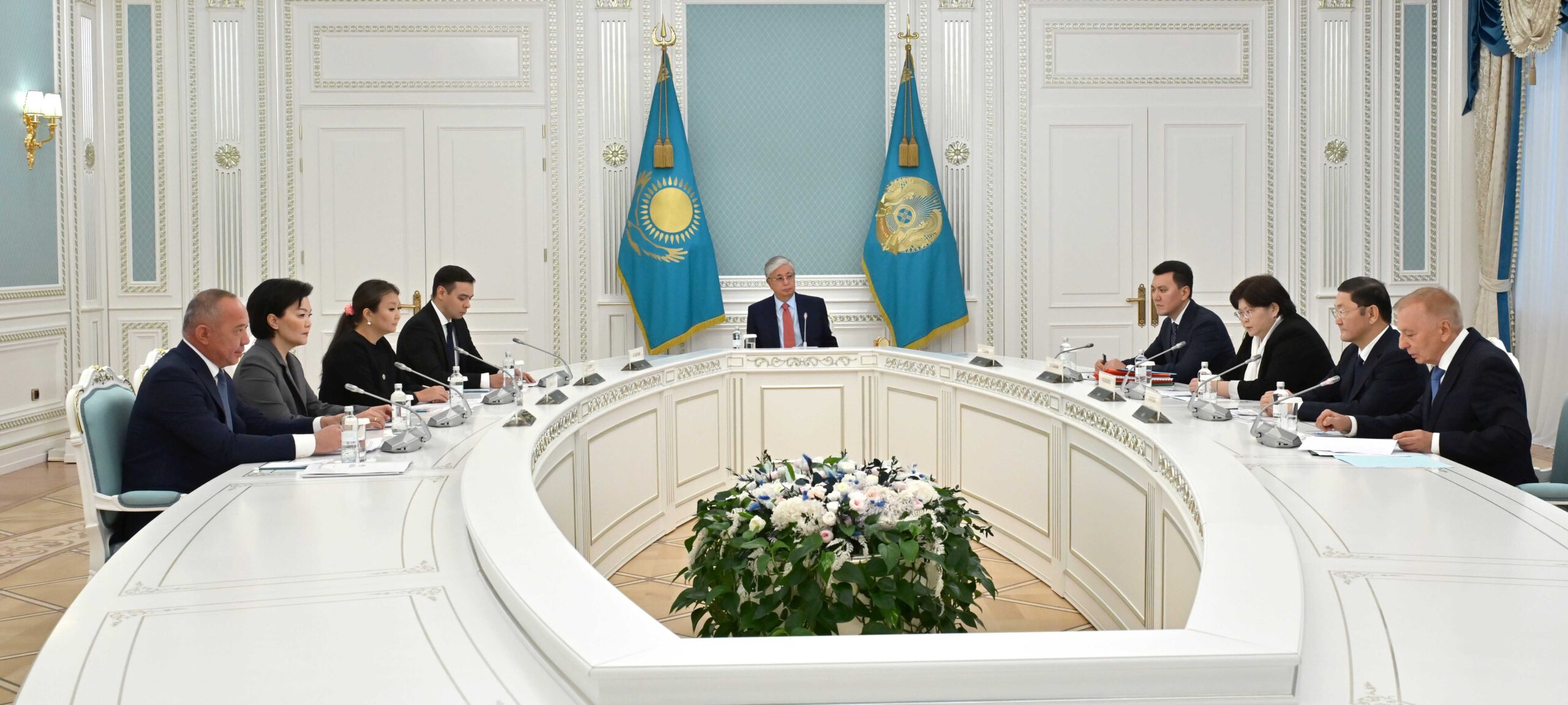ASTANA – President Kassym-Jomart Tokayev outlined several priority tasks for the human rights protection system at an Aug. 29 meeting with commissioners for human and children’s rights, reported the Akorda press service.

Kassym-Jomart Tokayev. Photo credit: Akorda.
Constitution Day
The meeting took place on the eve of Constitution Day on Aug. 30, a significant occasion for Kazakhstan.
“The Constitution is a crucial document that safeguards our statehood. Strict adherence to its provisions is essential for establishing justice and the rule of law,” stated Tokayev.
Constitutional changes
The President discussed the large-scale constitutional reform, supported by citizens in a referendum last year, which significantly altered the state model.

President Tokayev meets with human and children rights commissioners. Photo credit: Akorda.
The reform led to the establishment of the Constitutional Court and elevated the status of both the Ombudsperson and the Prosecutor’s Office.
According to Tokayev, the previous Constitutional Council considered only around 140 cases in over 25 years—roughly five cases annually. In contrast, the new Constitutional Court reviewed 43 cases and ruled on 23 of them in just the first seven months.
These changes have enhanced the interaction between citizens and the state, with more individuals now able to directly petition the Constitutional Court, thereby bolstering both the protection of their rights and the legal system at large.
The number of applications to the Ombudsperson has doubled, and prosecutorial supervision over the protection of constitutional rights has increased as well.
The surge in appeals and complaints reflects the expanded opportunities created by constitutional changes, and highlights long-standing issues in the relationship between authorities and citizens.
The Commission for the Protection of Human Rights under the President serves as the primary platform for expertise. It amalgamates the capabilities of government agencies and civil institutions, aiming to foster substantive discussions and exchanges on realizing the potential of constitutional reforms and their impact on citizens’ quality of life.
Focus on preventive measures
The President instructed human rights and law enforcement structures to work proactively in all areas of concern. He instructed these bodies to develop predictive tools for preventing violations of citizens’ rights, while also emphasizing the importance of close collaboration with civil society.
Tokayev noted that human rights institutions should actively engage experts from non-governmental organizations. He encouraged fostering an open dialogue with the human rights community for evaluating the progress of ongoing reforms. “The interaction with international structures and the incorporation of indicators used by partners to assess the human rights situation are of utmost importance,” he said.
Improving Constitutional Court activities
The President emphasized that as citizens raise concerns about compliance with the Constitution, particularly specific legal provisions and other normative acts, the government should diligently review legislation. He stressed the importance of integrating Constitutional Court decisions into the legislative framework.
He also called for enhanced collaboration between the Parliament and the Constitutional Court, noting that members of the Mazhilis—the lower house of Parliament—have the authority to amend normative legal acts.
Enhancing the Efficiency of Ombudspersons and Special Mandate Commissioners
President Tokayev stated that Special Mandate Commissioners, such as the Commissioner for Children’s Rights and the Commissioner for the Rights of Socially Vulnerable Categories of the Population, should have greater influence in governmental decision-making processes.
He emphasized that these commissioners should actively work to mitigate risks for vulnerable groups. Additionally, the role of the Children’s Ombudsperson in appointing regional commissioners should be fortified.
“The primary duty of commissioners is to tenaciously advocate for the interests of citizens and protect their rights,” the President asserted.
Administrative justice
Following the introduction of administrative justice, nearly two-thirds of legal decisions now favor citizens and businesses in cases against government agencies. However, Tokayev observed that state bodies frequently fail to learn from these rulings and make appropriate adjustments.
He directed both the government and the Business Ombudsperson to implement preventive measures and suggested that this rate of favorable decisions could serve as an additional criterion for evaluating the performance of state agencies.
Ensuring excellence in judicial and law enforcement systems
President Tokayev cited statistics indicating a rising level of public dissatisfaction with court rulings, supervisory bodies, and law enforcement agencies. He acknowledged that citizens frequently face difficulties in obtaining justice through conventional channels and often resort to contacting the Presidential Administration.
He noted that the majority of complaints concern the courts, the police, and the Prosecutor’s Office, and emphasized that resolving these issues requires active involvement and intervention.
“Interference in the work of the commissioners is not permissible,” stressed Tokayev.
Enhancing legal literacy and public information
Emphasizing the importance of awareness-raising and legal education, President Tokayev directed human rights institutions to collaborate with experts to elevate legal literacy among citizens.
“Most infringements on citizen rights and freedoms occur in remote areas where access to information and legal support is limited,” he noted.
Human rights organizations are tasked with enhancing the legal awareness of citizens and disseminating comprehensive information about safeguarding their rights. Tokayev emphasized that public discourse should be consistently guided by these institutions.
The President also spotlighted the need to focus on the concerns of rural residents, including issues related to land use, pasture distribution, and the accessibility and quality of infrastructure, with the aim of narrowing the urban-rural divide.
“The ultimate goal is to achieve tangible results that are evident to the populace,” the President concluded.
Human Rights Commissioner Artur Lastayev, Ombudsperson for Children’s Rights Dinara Zakiyeva, Ombudsperson for the Rights of Socially Vulnerable Categories of the Population Svetlana Zhakupova, Ombudsperson for the Protection of Entrepreneurs’ Rights Rustam Zhursunov, and Chairman of the Human Rights Commission under the President, Igor Rogov, also shared their remarks.
The meeting was attended by State Counselor Erlan Karin, Chair of the Constitutional Court Elvira Azimova and Prosecutor General Berik Asylov.
